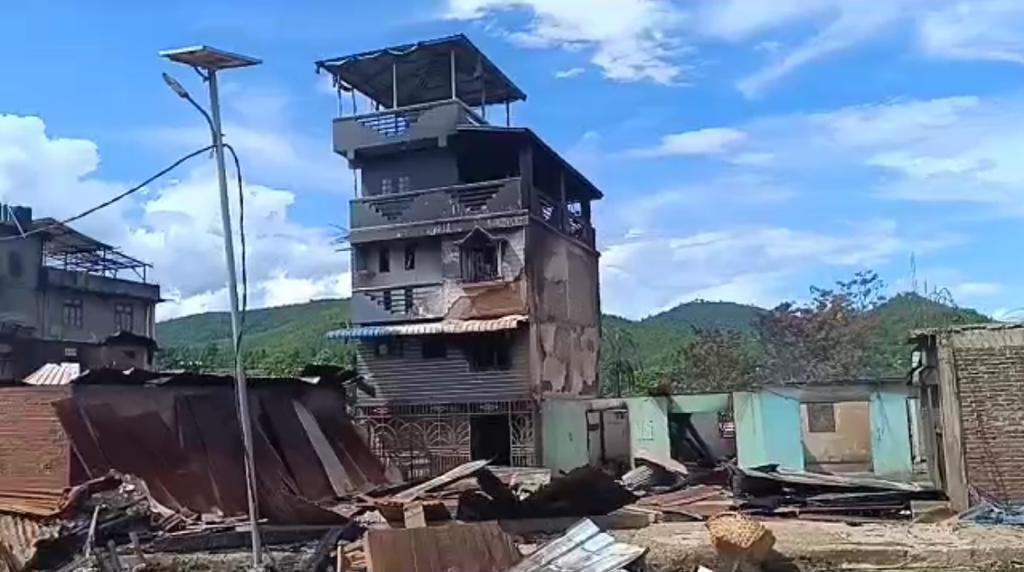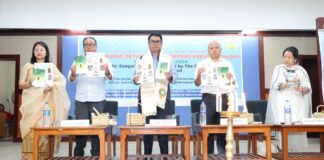By S. J. Meetei
Every day, news from Manipur continues to make headlines. Regrettably, it is disheartening to observe that Moreh, which was a significant location associated with the unfortunate event on May 3rd, 2023, has received minimal or almost no specific discussion.
Meeteis, once the majority community in the Moreh town, were totally driven out of the town by the Kuki illegal immigrants. The houses of the Meitei were totally burnt down and destroyed.
Moreh holds significance not only due to its strategic security location as a neighbour to Myanmar but also due to its substantial contribution to the state’s economy. While I lack precise figures, I speculate that Moreh’s economic impact is considerable, potentially constituting more than 15% of the state’s total economy.
Regrettably, the deliberate and careful manipulation of Moreh’s demographic composition occurred discreetly and systematically, evading substantial attention. Nearly thousands of Meitei households were deliberately set ablaze, leading to the displacement of a significant Meitei population during the tragic incident on May 3, 2023. This orchestrated act was masterminded by vested interests, including illegal immigrants. Additionally, various other communities such as Nepali, Bihari, Muslim, and Bengali were also adversely affected by this unfortunate event.
Owing to its geographical placement, situated more than 100 km away from the Imphal valley, those who were displaced sought refuge in military camps for a period extending beyond 10 days. Throughout this timeframe, the children grappled with a shortage of nourishment and inadequate clothing. A considerable number of young individuals fell sick, displaying signs of fever and other water-related illnesses upon their arrival in the Imphal Valley.
In my perspective, a significant question persists: even with the deployment of substantial central forces, why was the evacuation of the Meitei population from the Army camp in Moreh delayed for more than 10 days? This situation also prompts a sense of doubt, leading me to question whether our Indian Army and its paramilitary forces are less capable compared to the so-called Kuki militants, or if there are vested interests among lawmakers aiming for the ethnic cleansing of the Meitei community from Moreh. Furthermore, it leads me to question whether illegal militants might have some illicit dealings with lawmakers or even connections to the central security forces.
Furthermore, I recall the deliberate and planned efforts of Kuki communities to rename roads and villages from Meitei names to Kuki names. It is bewildering how our intellectuals overlook or consented to such actions. Is it not surprising that our bureaucrats, including the ADC, SDO, and DC, the central security forces present, during their respective tenures, allowed such moves by the new encroachers? The silence surrounding these developments over the years raises questions and concerns about the role and actions of various authorities. Thousands of Meitei were displaced from Moreh, including over 200 Meitei individuals, who crossed the border during the unfortunate incident on May 3rd and have remained trapped in the jungles of Myanmar since the occurrence of the event on 3rd May. Regrettably, there is no indication of a government-led rescue operation for these stranded Meitei individuals even after more than 100 days of being stranded in the Jungle of Myanmar. Neither our media nor our politicians, our countrymen and the so-called Human Rights activities including those women wing from the mainland have shown concern by questioning the government’s failure to repatriate these stranded Indian citizens from a neighbouring country, Myanmar. Had the situation involved communities from mainland India, the government would likely have responded promptly and initiated immediate rescue efforts.
Notably, our media, politicians, human rights organizations, and other women’s safety advocacy groups would undoubtedly raise their voices if an incident involved a dog bite or a gang shooting random individuals. However, their concern appears diminished when it comes to the events unfolding in Manipur, as they seem to prioritize their political agendas over addressing the situation. Their visits are confined primarily to Kuki-dominated regions such as Churachandpur and Kangpokpi, and a tourist visit to some areas of Imphal. Strangely, these self-styled advocates of peace have never attempted to visit places like Moreh, where entire Meitei communities were forcibly uprooted and thousands of properties and homes were reduced to ashes. What is disheartening is that these visitors even conclude that the suffering is borne by the Kuki community, without recognizing the crucial fact that these Kuki illegal immigrants not only infiltrated the Meitei legacy with their deceitful intentions but also attempted to wipe out the Meitei communities. Once a beautiful town, Moreh has transformed into a hub of drug cartels due to the influx of these illegal immigrants.
A hundred days have gone by, and more than 200 Meitei communities have remained stranded on foreign soil, Myanmar. The powerful Indian government, citizens of the country and its media remain as mute spectators. Such differential treatment of the northeastern population by the government fosters a perception that there is minimal concern for our being part of this great Nation. We willingly embraced our place within the remarkable nation of India.
Nevertheless, following the events of May 3rd, a question emerges: “Has India truly embraced us?”
The statements, views and opinions expressed in this column are solely those of the author and do not necessarily represent those of the NEA.


